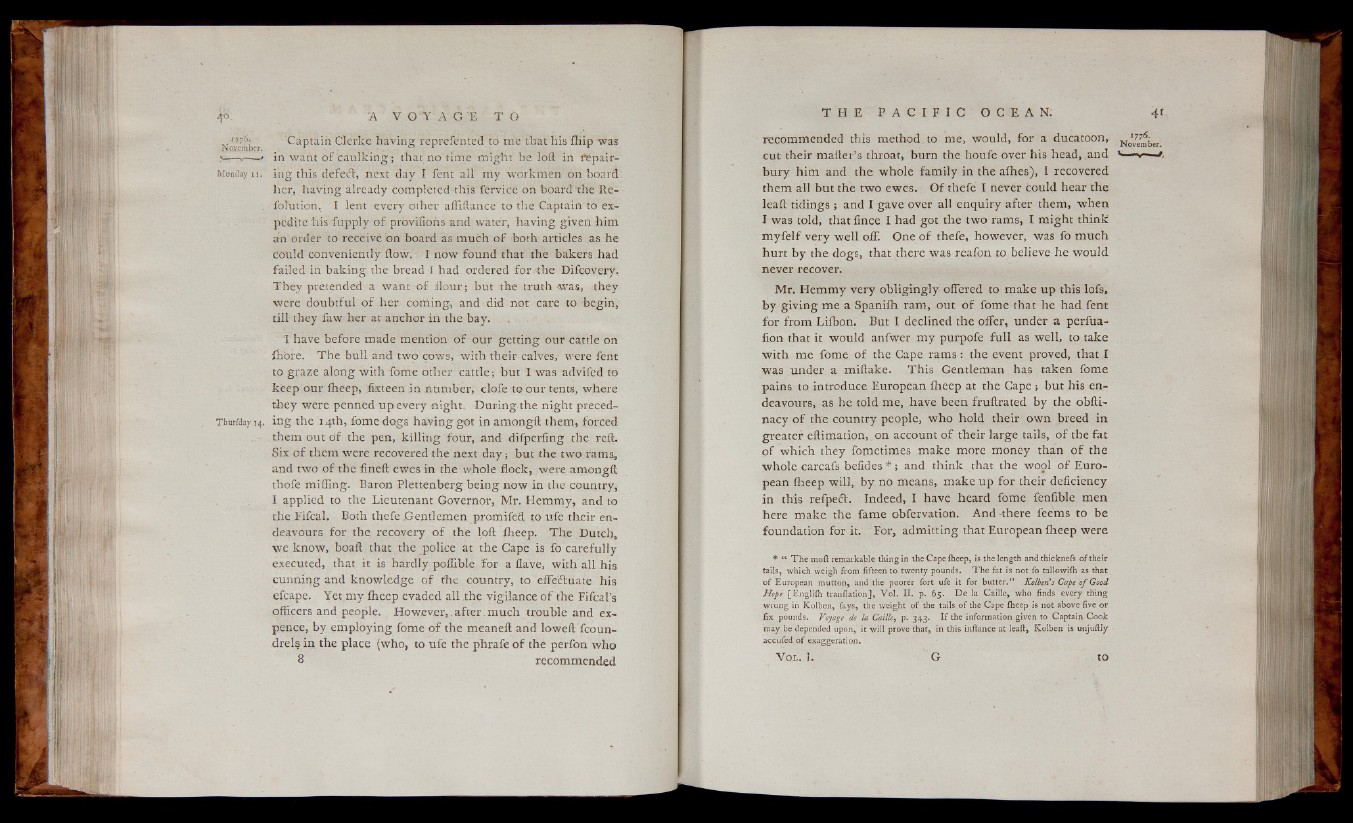
November Captain Clerke having reprefented to me that his ihip was
|— | in want of caulking; that no time might be loft in i*epair-
Monday ii. ing this defecft, next day I fent all my workmen on board
her, having already completed this fervice on board the Re-
. foliation, I lent every other afliftance to the Captain to expedite
his fupply of proviftons and water, having given him
an order to receive on board as much of both articles as he
could conveniently flow. I now found that the bakers had
failed in baking the bread I had ordered for'the Difcovery,
They pretended a want of flour; but the truth was, they
were doubtful of her coming, and did not care to begin,
till they faw her at anchor in the bay.
I have before made mention of our getting our cattle on
fhore. The bull and two cows, with their calves, were fent
to graze along with fome other cattle; but I was advifed to
keep our flieep, fixteen in number, clofe to our tents, where
they were penned up every night. During the night preced-
Tharfday 14. ing the 14th, fome dogs hawing got in amongft them, forced
them out of the pen, killing four, and difperfing the reft.
Six of them were recovered the next day; but the two rams,
and two of the fineft ewes in the whole flock, were amongft
thofe miffing. Baron Plettenberg being now in the country,
I applied to the Lieutenant Governor, Mr. Hemmy, and to
the,Fifcal. Both thefe Gentlemen pramifed, to ufe their endeavours
for the recovery of the loft flieep. The Dutch,
we know, boaft that the police at the Cape is fo carefully
executed, that it is hardly poflible for a flave, with all his
cunning and knowledge of the country, to effedluate his
efcape. Yet.my fheep evaded all the vigilance of the Fifcal’s
officers and people. However, after, much trouble and expence,
by employing fome of the meaneft and loweft fcoun-
drels in the place (who, to ufe the phrafe of the perfon who
8 re com m en d ed
recommended this method to me, would, for a ducatoon, .
cut their mailer's throat, burn the houfe over his head,,and '----»—■ J
bury him and the whole family in the allies), I recovered
them all but the two ewes. Of thefe I never could hear the
leaft tidings ; and I gave over all enquiry after them, when
I was told, that fince I had got the two rams, I might think
myfelf very well off". One of thefe, however, was fo much
hurt by the dogs, that there was reafon to believe he would
never recover.
Mr. Hemmy very obligingly offered to make up this lofs,
by giving me a Spanifh ram, out of fome that he had fent
for from Lifbon. But I declined the offey, under a perfua-
fion that it would anfwer my purpofe full as well, to take
with me fome of the Cape rams: the event proved, that I
was under a miftake. This Gentleman has taken fome
pains to introduce European flieep at the Cape ; but his endeavours,
as he told me, have been fruftrated by the obfti-
nacy o f the country people, who hold their own breed in
greater eftimation, on account of their large tails, of the fat
of which they fometimes make more money than of the
whole carcafs befides * ; and think that the wool of European
flieep will, by no means, make up for their deficiency
in this refpeft. Indeed, I have heard fome fenfible men
here make the fame obfervation. And -there feems to be
foundation for it. For, admitting that European flieep were
* “ The moft remarkable thing in the Cape iheep, is the length and thicknefs of their
tails, which weigh from fifteen to twenty pounds. The fat is not fo tallowiih as that
o f European mutton, and the poorer fort ufe it for butter.” Kolben’s Cape o f Good
Hope [Engliih tranflation], Vol. II. p. 65. De la Caille, who finds every thing
wrong in Kolben, fays, the weight of the tails of the Cape iheep is not above five or
fix pounds. Voyage de la Caille, p. 343. I f the information given to Captain Cook
may be depended upon, it will prove that, in this inftance at leaft, Kolben is unjuftly
accufed o f exaggeration.
V o l . I. G to